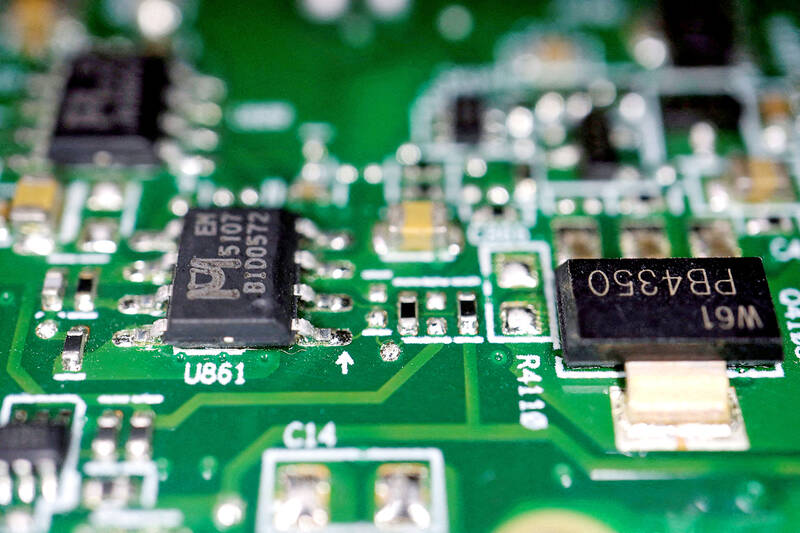The Philippines is trying to enlist Taiwanese chip giants to expand in semiconductors, a bid to catch up with its neighbors who are emerging as significant suppliers in the industry.
Taiwan Semiconductor Manufacturing Co (TSMC, 台積電) and United Microelectronics Corp (UMC, 聯電) are among companies the Philippines is reaching out to as it seeks equipment and expertise to build out chip fabrication operations, said Dan Lachica, head of the Southeast Asian country’s main electronics industry group, the Semiconductor and Electronics Industries in the Philippines Foundation Inc (SEIPI).
The association is working with Philippine officials in Taiwan to talk with potential partners.

Photo: Reuters
“What I am hoping is that TSMC or UMC or some other company aspiring for wafer fabs overseas is to consider: Send us your depreciated equipment, and in exchange, we’ll train the Filipino workers that you can deploy in your global operations,” Lachica said.
The country of more than 100 million people trails neighbors such as Malaysia and Singapore in the complex industry of chip manufacturing, where plants can require billions of dollars in initial investment. Taiwan is the world leader, and its companies including TSMC are expanding overseas to alleviate potential risks related to tensions between Taipei and Beijing.
TSMC representatives did not respond to a request for comment.
“It is UMC’s policy not to comment on market speculation,” a UMC spokesperson said in an e-mail.
The Philippines is betting that its low costs and ample workforce could help attract manufacturers. Talent shortage is one of the main challenges for global chipmakers from the US to Malaysia — the industry would need more than 1 million additional skilled workers across the world by 2030, Deloitte has estimated.
Taiwan and the Philippines enjoy a trade relationship, and both have recurring tensions with China. Beijing has repeatedly threatened Taiwan with invasion. Meanwhile, Philippine boats have clashed with Chinese vessels as the countries spar over the disputed South China Sea.
The SEIPI’s pitch is part of the country’s attempt to diversify beyond chip testing and packaging, a less advanced part of the manufacturing process that carries thin profit margins.
“We’re moving up the value chain as well in terms of IC design and hopefully, semiconductor wafer fab,” Lachica said.
The Philippines has lost ground to neighbors such as Vietnam over the past few years after a revamp of local incentive programs led to the flow of advanced manufacturing elsewhere, Lachica said.
The country’s electronics and semiconductor exports are set to contract by 10 percent this year because of inventory corrections, before rebounding by 5 percent next year, he said.
Philippine President Ferdinand Marcos Jr has backed a bill seeking to change the incentive regime to attract more foreign investors. Meanwhile, efforts backed by the US and Japan to build Philippine infrastructure bode well for the industry’s prospects.
“We are handicapped by the aggressiveness of Vietnam, Indonesia and Malaysia,” Lachica said. “We need to come up and essentially tell the world that the Philippines is open for business again.”

TARIFFS: The global ‘panic atmosphere remains strong,’ and foreign investors have continued to sell their holdings since the start of the year, the Ministry of Finance said The government yesterday authorized the activation of its NT$500 billion (US$15.15 billion) National Stabilization Fund (NSF) to prop up the local stock market after two days of sharp falls in reaction to US President Donald Trump’s new import tariffs. The Ministry of Finance said in a statement after the market close that the steering committee of the fund had been given the go-ahead to intervene in the market to bolster Taiwanese shares in a time of crisis. The fund has been authorized to use its assets “to carry out market stabilization tasks as appropriate to maintain the stability of Taiwan’s

STEEP DECLINE: Yesterday’s drop was the third-steepest in its history, the steepest being Monday’s drop in the wake of the tariff announcement on Wednesday last week Taiwanese stocks continued their heavy sell-off yesterday, as concerns over US tariffs and unwinding of leveraged bets weighed on the market. The benchmark TAIEX plunged 1,068.19 points, or 5.79 percent, to 17,391.76, notching the biggest drop among Asian peers as it hit a 15-month low. The decline came even after the government on late Tuesday authorized the NT$500 billion (US$15.2 billion) National Stabilization Fund (國安基金) to step in to buoy the market amid investors’ worries over tariffs imposed by US President Donald Trump. Yesterday’s decline was the third-steepest in its history, trailing only the declines of 2,065.87 points on Monday and

TARIFF CONCERNS: The chipmaker cited global uncertainty from US tariffs and a weakening economic outlook, but said its Singapore expansion remains on track Vanguard International Semiconductor Corp (世界先進), a foundry service provider specializing in producing power management and display driver chips, yesterday withdrew its full-year revenue projection of moderate growth for this year, as escalating US tariff tensions raised uncertainty and concern about a potential economic recession. The Hsinchu-based chipmaker in February said revenues this year would grow mildly from last year based on improving supply chain inventory levels and market demand. At the time, it also anticipated gradual quarter revenue growth. However, the US’ sweeping tariff policy has upended the industry’s supply chains and weakened economic prospects for the world economy, it said. “Now

An employment discrimination lawsuit against contract chipmaker Taiwan Semiconductor Manufacturing Co (TSMC, 台積電) might soon be expanded after a hearing in a federal court in San Jose, California, on Tuesday to add 15 plaintiffs to the case. According to a court document, the lawsuit, which was refiled in November last year as a form of a class action with 13 plaintiffs in California, wants to add 15 plaintiffs from Arizona, where TSMC is building up its wafer fab capacity. TSMC first committed between 2020 and last year to invest US$65 billion in three advanced wafer fabs in Arizona. It then pledged an